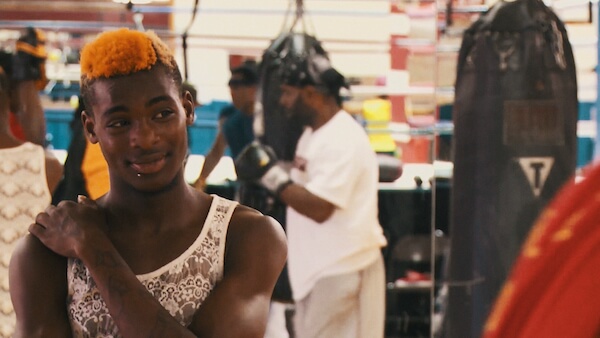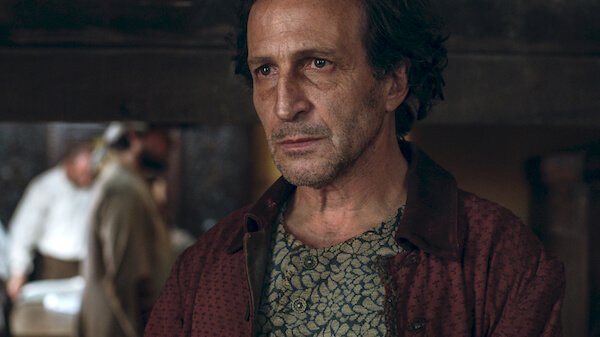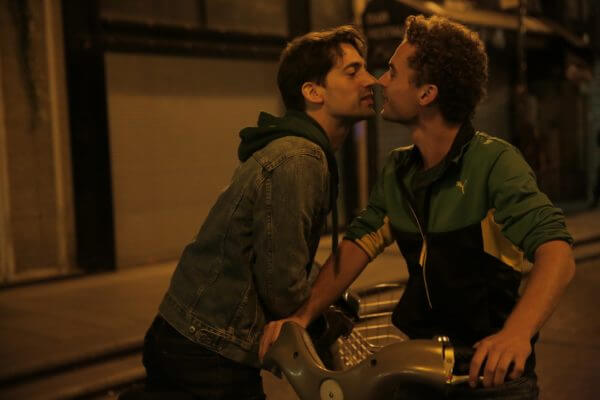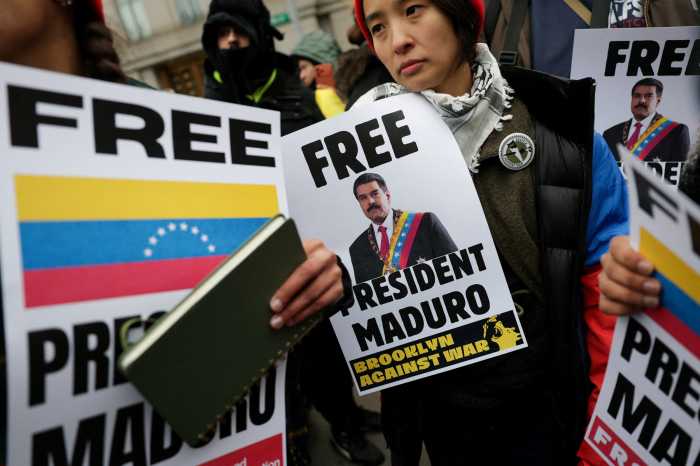Arinze Kene and Russell Tovey in Ben A. Williams’ “The Pass.” | NEWFEST
BY GARY M. KRAMER | This year’s NewFest, New York City’s LGBT film festival, boasts its largest program to date, with more than 100 features, documentaries, and shorts. If the entries are a bit of a mixed bag, at least there is an effort to screen something for everyone.
The festival opens October 20 with “The Pass” (SVA, 7 p.m.), director Ben A. Williams’ riveting adaptation of John Donnelly’s play about British footballers Jason (Russell Tovey) and Ade (Arinze Kene). The young men are sharing a hotel room in Romania the night before they compete for a position on a pro team. The guys’ horseplay that night involves some homoerotic wrestling that culminates with a kiss — a moment they rehash when they reunite in a different hotel room in the third act 10 years later.
Tovey, who is onscreen — and mostly shirtless — for the film’s entire 90 minutes, gets deep inside the insecure, troubled head of Jason. He makes viewers understand — if not sympathize with — this not particularly nice guy whose sexuality conflicts with his image as an athlete. It is Tovey’s intense, spellbinding performance — informing the film’s astute observations about identity and masculinity — that makes “The Pass” worthwhile.
Bigger than ever, NewFest offers variety to suit diverse tastes
Another film about two guys together is “Paris 5:59: Theo and Hugo” (SVA, Oct. 21, 9 p.m.) by gay filmmakers Olivier Ducastel and Jacques Martineau. This remarkable French romance opens with an astonishing, explicit, nearly wordless 18-minute sequence set in an after-hours Parisian sex club. Theo (Geoffrey Couët) sees Hugo (François Nambot) and is smitten. They have an erotic encounter that segues into their spending the remainder of the film, which takes place in real time, together — and perhaps falling in love. This enchanting romance — with serious moments involving Hugo being HIV-positive — follows the two men biking through the streets, sharing a meal, and staring at each another, lovingly, on the metro. Couët and Nambot are magnetic together, and they are especially sexy sans clothes.
Geoffrey Couët and François Nambot in Olivier Ducastel and Jacques Martineau’s “Paris 5:59: Theo and Hugo.” | NEWFEST
Tom E. Brown’s “Pushing Dead” (SVA, Oct. 21, 8:15 p.m.; LGBT Center, Oct. 22, 8 p.m.) is billed as an “AIDS comedy,” but there are hardly any smiles in this lame film about Dan (James Roday) who is HIV-positive and broke. While he can’t afford the meds he needs, Dan takes care of others, including his needy boss, Bob (Danny Glover), and an injured drag queen. Dan even buys his roommate Paula (Robin Weigert) a stuffed monkey she becomes obsessed with in the film’s stupidest subplot. Dan does get a chance for romance with Mike (Tom Riley), a handsome Brit he encounters, but most of “Pushing Dead” revels in Dan’s being down on his luck, making this comedy about as much fun as a kidney stone. Unfortunately, it seems to pass no more quickly.
The quirk in the quirky American indie “I Love You Both” (Cinépolis, Oct. 23, 3 p.m.) is that twin co-writers and stars Kristin (Krystal) and Doug (Donny) Archibald — she’s straight; he’s gay — are both attracted to the bisexual Andy (Lucas Neff). This deadpan comedy mines its humor from this offbeat love triangle, but wisely the film is less about whom Andy will choose and more about how his decision will impact the twins’ relationship. If viewers can appreciate Krystal and Donny’s co-dependency, this film, directed by Doug, will charm them; otherwise, the twee “I Love You Both” will annoy. Regardless, the twins’ fabulous, scene-stealing mom, Charlene Archibald, will amuse.
Also more deadpan than screwball is “Women Who Kill” (LGBT Center, Oct. 21, 8 p.m.; Cinépolis, Oct. 24, 2:30 p.m.), a comedy thriller about exes Morgan (writer/ director Ingrid Jungermann) and Jean (Ann Carr) who produce a podcast about female serial killers. What starts out in a amiable low-key mode shifts gears when it introduces Simone (Sheila Vand), a mysterious beauty who becomes Morgan’s new girlfriend. But Jungermann never generates enough dramatic tension to sustain its central question: Is Simone a murderer? Which means that the film boxes itself into a corner from which it never escapes. “Women Who Kill” ultimately lacks the spiritedness to be truly thrilling.
“Blush” (Cinépolis, Oct. 23, 3:30 p.m.), from Israeli writer/ director Michal Vinik, is an engrossing drama about Naama (Sivan Noam Shimon), a teenager who is intrigued by Dana (Hadas Jade Sakori), a new girl at school. They cut class and do drugs, and their fast friendship soon leads to kissing in the park and going to a lesbian club in Tel Aviv. Naama’s bliss, however, is interrupted by her parents’ worries about Liora (Bar Ben Vakil), her sister who has disappeared from the army. “Blush” juxtaposes the two sisters’ lives as it captures all the thrills of Naama’s first love. If the film ends in a not unexpected fashion, Shimon’s strong central performance elevates this familiar tale.
Maura Anderson’s modest lesbian feature “Heartland” (Cinépolis, Oct. 22, 2 p.m.), set in Oklahoma, has Lauren (co-writer Velinda Godfrey) losing her girlfriend, her home, and her job in the first five minutes. With nowhere to go, she moves in with her barely tolerant mother (Beth Grant), just as her brother Justin (Aaron Leddick) and his girlfriend Carrie (Laura Spencer) arrive with plans to open a local winery. Lauren’s bonding with Carrie over drinks soon leads to them kissing — and more — when the young women share a bathtub during a tornado warning (it’s an Oklahoma thing). Major family drama ensues, but none of it is particularly novel or interesting. Godfrey’s acting is better than her writing, which is what makes “Heartland” passable.
Skittles in Dana Flor and Toby Oppenheimer’s documentary “Check It.” | NEWFEST
The hate crime rate for LGBT youth in Washington DC is alarmingly high, so a gang called Check It was created to combat bullying — by fighting back. Dana Flor and Toby Oppenheimer’s inspiring documentary “Check It” (LGBT Center, Oct. 23, 11 a.m.) introduces several engaging queer youth of color including Trey, who is more comfortable living as a woman than as a man, and Skittles, a talented and wiry young guy who could have success on the boxing circuit. Though the group’s members face problems — as victims of rape and other violence and in the sex work some are involved in — what comes across is the resilience of these kids who literally fight for everything they have, passionately and with style.
The Brazilian import “The Nest” (Cinépolis, Oct. 23, 9 p.m.) is a four-part TV miniseries. Bruno (Nicolas Vargas), on leave from the army, is searching for his brother Leo, who ran away from home years ago. He quickly falls in with a motley crew of LGBT youth in Porto Alegre, and even shares a few kisses with them. Where Bruno’s story goes remains to be seen — only the first episode was available for preview — but “The Nest” is compelling enough to warrant a look.
Also from Brazil, “The Cult” (Cinépolis, Oct. 22, 10 p.m.) feels more like a TV episode than a feature film. In 2040, a nameless young man has moved back to Recife from a space colony. He spends his days drinking tea, reading, wandering around abandoned buildings, and cruising — which leads to him lying in bed with other naked young men. There is not much to do in Recife, 2040, apparently, and not much happens in this film — that is until the protagonist discovers the title cult. Alas, the payoff of this stylish but empty production is really more of a letdown.
NEWFEST | Oct. 20-25 | Cinépolis Chelsea Cinemas, 260 W. 23rd St. | SVA Theatre, 333 W. 23rd St. | Screening Room, LGBT Community Center | 208 W. 13th St. | Tickets are $16; $60 opening night; $50 closing night | newfest.org






































